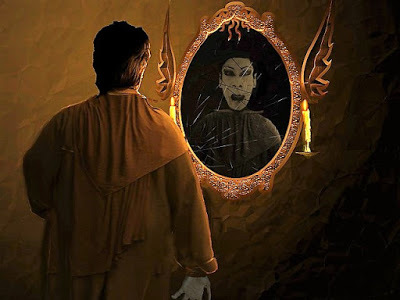Stephen Roney's Blog, page 204
March 5, 2021
How to Hold a Postmodern Discussion Group
Friend Xerxes has proposed some formal rules for any discussion:
1. Speak from your own experience.
2. Everyone’s experience is valid.
3. No one’s experience is ever wrong. That’s how they experienced it; that’s the way it is for them.
He objects, by contrast, to Christians relying on quoting the Bible. He objects to referring to dictionary definitions. This, he believes, prevents discussion.
Among the other things he thinks prevent discussion is discussion. Another proposed rule is:
4. Accept that anyone may tell you, at any time, that you have said enough.
Xerxes is half right about appeals to authority. A simple appeal to authority is a recognized logical fallacy. It is not enough to say “Einstein said X,” or “Aquinas said Y”; you need to offer reasons and evidence. You may have gotten them from such a figure; but the reasons or evidence stand on their own. They cannot be accepted simply because Einstein or Aquinas said it. This is a version of the ad hominem fallacy.
But the alternative is not individual “experience.”
Consider science. Science rejects all appeals to authority. Its standard of proof is controlled and repeated experiment: the scientific method. Which itself has accepted rules and standards. Only if everyone agrees on and follows these rules—an authority—can any legitimate scientific assertion be made. The scientific discussion is invariably over whether these rules were indeed properly followed. To rely on personal experience instead is to rely on mere anecdote and superstition. It throws everything back to the Cro-Magnon: the sun rotates around the flat earth, and the moon is made of moldy cheese.
For a discussion among Christians, the text of the Bible is the proper authority. Only if everyone accepts this authority, along with certain rules of textual criticism, and perhaps a common creed, can any meaningful discussion occur. Without this, the conversation easily veers off in any direction; there are no grounds for agreement or disagreement on anything. Satan might be the messiah.
In politics, or in court, the standard is the constitution and the doctrine of human rights. If all parties do not agree on this much, civil discourse breaks down and revolution, war or civil war ensues. Everyone asserts what they want, and, if others do not agree, come to blows or guns or guillotines.
Sadly, that is about where we are in political discourse in North America right now. The left has aggressively rejected the constitution, the principles of the Declaration of Independence, and the doctrine of human rights as “white supremacy.”
For any discussion at all, you need to rely on a shared definition of the words you use. Otherwise you are only making animal sounds. This is what dictionaries are for. Lacking that, the meaning of each new word must be agreed upon or asserted before being used. Which cannot be done unless the meaning of all the words used to define this word are themselves previously agreed upon. Otherwise, the speaker is only wasting everyone’s time. But to require this is almost equally wasting everyone’s time.
Also in any conversation at all, if you rely on “everyone’s experience,” and “no one’s experience is ever wrong,” if no one’s experience can ever be challenged, there is no basis for any discussion.
 Bethlehem Asylum, London.
Bethlehem Asylum, London.The person beside you declares that, in his experience, he is Napoleon Bonaparte, but is currently being pursued relentlessly by the CIA in collusion with lizard-formed aliens.
All you can properly do in response is nod and smile. If you say your experience is different, that is a challenge. That is denying his lived experience. If you say your experience is the same—that too is a challenge, since you can’t both be Napoleon, can you?
The person across from you then complains angrily that in their experience every Jew is cunning and malicious, and something ought to be done about them. Germans, however, and other Northern Europeans, are clearly a superior race.
You nod and smile.
The woman on your right insists that it is only proper to kill babies and eat them; and she plans to do so this Saturday.
You nod and smile. Perhaps you hope it is not your baby she is thinking of.
At all of this you must simply nod and smile; there is no possibility of discussion.
But then someone over to the left pipes up impudently that in their experience, there is a right and a wrong which applies to all mankind, that murder is always wrong, people are equal in moral worth, and some things are real, and others not.
This person you must silence or drive out of the discussion.
Or perhaps eat.
'Od's Blog: Catholic comments on the passing parade.
March 4, 2021
And to Think That I Saw It in 2021
The current hysteria of blacklisting and censorship has now reached Dr. Seuss. A year ago, this sounded absurd. What still sounds absurd today is likely to be law tomorrow.
I managed to dig up online some of the offending images that have prompted this.
These are simply comic stereotypes. All figures in any cartoon format are comic stereotypes.
Imagine, for comparison, if you are Canadian like me, a Seuss illustration of a Canadian as a lumberjack wearing a red plaid shirt, suspenders, hobnail boots, and a cap with ear flaps? Or a Mountie uniform? We might roll our eyes at the supposedly ignorant Yank. But would we feel offended? Why?
'Od's Blog: Catholic comments on the passing parade.
March 2, 2021
Invictus
My pal Jack Rigg reads the poem commonly known as "Invictus."
February 28, 2021
Read a Book Week

From March 7 to March 13, the electronic version of Playing the Indian Card will be available for half-price at Smashwords.com. That's $2.49 for the sort of book that would usually retail for over $30.
If you enjoy having your mind blown, you'll enjoy the book.
https://www.smashwords.com/books/view/787100
The "A" Word Is Invoked

In his recent column supporting assisted suicide, Xerxes brought up the fact that abortion is legal to justify legalizing extending “assisted suicide” to the mentally ill as well.
So there, anyone who refuses to believe in slippery slopes. All slopes are slippery in the law.
Xerxes writes:
“On the one hand, a mother – who may or may not have consented to becoming pregnant – imposes her will on a fetus that cannot yet express its own wishes.
On the other hand, a group of outsiders – in the U.S., a collusion of elderly white male politicians – imposes their standards, their values, to prevent that mother from having an abortion.
It seems to me just as wrong to say a woman cannot have an abortion as it would be to require that she must have an abortion.”
Let’s parse this. A woman may not have consented to becoming pregnant, per se; but we are responsible for the consequences of our actions. You could as easily say that, if the father did not intend to make the mother pregnant, he has no legal responsibility for that child. No paternity suit could stand. Nor could any father be required to support a child within marriage. Nor could anyone be held responsible for running someone over with his car while drunk.
If the mother then chooses to abort, she is not, as Xerxes formulates it, merely “imposing her will” on the fetus. One “imposes one’s will” if one breaks into a line; indeed, one might be imposing one’s will on a number of people. Yet we do not consider that equivalent to mass murder. She is killing it.
She is also imposing her will on the father of that child, who has equal moral rights to it. She is denying his reproductive rights. He cannot require her to have an abortion, and he cannot prevent her from having one.
I suspect we do not want an individual father to have either of those rights. It follows that we cannot allow the mother to have them either.
Laws against abortion are not, as Xerxes disingenuously claims, a “collusion of elderly white male politicians” to impose their will. In a democracy, politicians are elected by the population as a whole. They express the will of the people.
Indeed, this same argument, used here to justify abortion, and then assisted suicide, would equally argue that murder must be legalized, and rape, and pedophilia.
If there is an argument for abortion to be legal, this isn’t it.
'Od's Blog: Catholic comments on the passing parade.
Government-Assisted Murder?
 "Life Unworthy of Life": 1938 Nazi German poster.
"Life Unworthy of Life": 1938 Nazi German poster.
Friend Xerxes the leftist columnist has weighed in on assisted suicide for the mentally ill. He is for it.
I am not current on “Medical Assistance in Dying,” but the issue of what to do about the mentally ill seems to me to confirm the wisdom of G.K. Chesterton: if anyone wants to tear down a fence, they must first demonstrate awareness of why it was there in the first place.
If, on the one hand, one refuses the same right to the mentally ill that we extend to everyone else, this is discrimination against the mentally ill. So, apparently, the Quebec courts have now ruled. The right to be put to death by the state must now be extended to the mentally ill, those with Alzheimer’s, the unconscious, minors, and the mentally retarded.
But “suicidal ideation” is a standard symptom of virtually all mental illness. Which is as much as to say, if we extend this right to them, it arguably amounts to a genocide against the mentally ill; they are in effect being killed for being mentally ill. Awkwardly, that is just how Hitler’s policy of genocide began: with exterminating the mentally ill, those with Alzheimer’s, and the mentally retarded, as “life not worthy of life.”
Worse, there is a growing belief among psychiatrists/psychologists that mental illness in general is akin to PTSD: it is caused, in other words, by one’s environment, one’s life situation, by those around the victim, especially in childhood. “Gaslighting” is becoming a familiar term, and a familiar notion: people are driven mad. If this is true, mental illness is a case of someone being driven to kill themselves. Having the government assist makes the government complicit in murder. A perfect way to get rid of an unwanted spouse, child, or other relative.
The same consideration arises to a lesser extent for those with Alzheimer’s, or in a coma. But at least in this latter case, the relative or intimate making the decision to kill has not themselves caused the problem.
The only solution is to pull away from the whole business of assisted dying. Bad idea. Some will suffer. But there was a reason for that fence.
'Od's Blog: Catholic comments on the passing parade.
February 27, 2021
Mary and Islam

A Muslim (Persian) depiction of Mary with Jesus
Nobody gets religion; on the left or on the right.
A piece from PJ Media claims the Vatican has “betrayed” Mary by saying she is a bridge among Jews, Christians, and Muslims. They object to the claim in a Vatican document that she was “a Jewish, Christian and Muslim woman.” After all, how could she have been a Muslim -- “A religion that came into being 600 years after Mary died.”
Bad theology there, pal. Mary did not die, in the conventional sense. The term is “dormition.” She ascended bodily into heaven. At least, that is what Catholics believe. Even if she hadn’t, she, like all the saints, is alive in heaven. Accordingly, why couldn’t she have become a Muslim at some point after 622 AD?
This further supposes, falsely, that Islam began with Muhammad, as Christianity began with Jesus Christ. By that assumption, when did Judaism begin? “Islam”” means “submission”: that is, submission to the one true God. Accordingly, as far as Muslims are concerned, there were Muslims long before Muhammed, including Abraham, Moses, Jesus, and, of course, Mary. They would have thought and believed all the same things Muhammed thought. Muhammed did not come to change anything, but to restore the true faith, and place a seal on it.
The article’s second objection is that “Islam presents Mary, the Mother of Christ, as ‘married’ to and ‘copulating’ with Muhammad in paradise.” Shocking? Why? Did you suppose God was against sex?
Ah, but, the article says, this claim violates the Christian doctrine that she was eternally a virgin.
That is not the Christian doctrine. That is the Catholic and Orthodox doctrine. If this fatally alienates Islam from Christianity, it equally divides Christianity.
Moreover, the Muslim claim is actually compatible with Mary being eternally a virgin. In fact, Islam believes she was. They are closer to Catholicism here than Protestantism is. Marriage in heaven is necessarily a very different matter from marriage on earth. The article makes the point that the Arabic word implies copulation, not some Platonic relationship. Fine—but imagine how “sex” works in heaven, given that in heaven one does not, until the resurrection, have a body. Perhaps Mary, uniquely, does; even if so, Muhammed does not. Does this really contradict the concept of Mary’s virginity? How exactly?
Third, even if this hadith were controversial for Christians, it is not an article of faith for Muslims. A hadith is a tradition about Muhammed, not something from the Quran, and all hadiths are not equal. The chain of authority behind this particular hadith, according to a Muslim site, is “weak.” Any Muslim is free to take it or leave it.
Undeniably, there are differences between Christianity and Islam. But there is a tendency to exaggerate them.
'Od's Blog: Catholic comments on the passing parade.
February 26, 2021
All I Really Need to Know I Learned in Kindergarten
 Charlotte and Uncle
Charlotte and UncleCharlotte’s Web is a fable. Whenever you have animals talking and acting like humans, you are reading a fable.
Okay, or maybe a Looney Tunes cartoon.
Why talking animals?
Because animals can swiftly and unambiguously illustrate human character traits and types: ants industry, wolves malice, foxes cleverness, and so on.
And this is to teach a moral, some broad general advice about life. Be like the ant; don’t be like the fox.
Charlotte’s Web plays with this convention. Rats are selfish, and Templeton is selfish. Geese are silly, and the geese in Zuckerman’s farm are silly. Pigs are supposed to be slothful and greedy; Uncle, one pig in the story, is slothful and greedy. But then Wilbur breaks the mold. He is greedy enough about his slops. He enjoys lying in manure. But he also does improbable backflips, and is eager to try spinning a web. Spiders are controlling and devouring; bloodthirsty. Charlotte is bloodthirsty, and she also schemes; but in a good way.
White more or less openly explains his point in Charlotte’s farewell soliloquy:
"After all, what's a life, anyway? We're born, we live a little while, we die. A spider's life can't help being something of a mess, with all this trapping and eating flies. By helping you, perhaps I was trying to lift up my life a trifle. Heaven knows anyone's life can stand a little of that."
The message is that we are all horribly flawed, all animals; we all eat bacon, and slaughter. And yet we can redeem ourselves, by good works: which is to say, by gratuitous acts of friendship--and by art. Charlotte is a writer: “a true friend and a good writer” serves in the book as her epitaph. Wilbur cannot weave words as she can; but his art is his backflips. His art is the dance, and this makes him “radiant.”
Trying not to prompt or lead them, I asked a class of Chinese students what they thought the moral of the fable was. They identified friendship; but when I asked for the book’s argument in favour of friendship, their response was, “if you do something for a friend, they will do something for you.”
This is an interpretation the book itself rules out. Wilbur is keenly aware that when Charlotte decided to save his life, he had done nothing for her; and was obviously unlikely to be able to. When she takes her great care building her egg sac, giving it her entire life force, she is doing something for children she will never meet, who will therefore never be able to do anything for her in return. When Wilbur brings the egg sac back to the barn, and nurses it, he is doing nothing for Charlotte in return for her kindness, but for other spiders she will never see and he does not know.
But the quid pro quo notion of morality that my Chinese students exhibit is exactly the argument for morality given by Xenophon in his parable, “The Choice of Hercules.”
“If you would gain the favor of the gods, you must be at the pains of worshiping them: if the friendship of good men, you must study to oblige them: if you would be honored by your country, you must take care to serve it.”
This was the classic ancient argument for moral behavior. It is obviously wrong from a Christian perspective. If you are doing good only in return for an expected reward, to Christians, you are not doing good at all.
Yet it seems to me this is the inevitable view of morality among pagans and atheists. Without God, there is no transcendent right and wrong; morality is just a business transaction.
And there is nothing intrinsically wrong, in the first place, with being a lazy swine or a bloodsucking spider.
'Od's Blog: Catholic comments on the passing parade.
All I Really Need To Know I Learned In Kindergarten
 Charlotte and Uncle
Charlotte and UncleCharlotte’s Web is a fable. Whenever you have animals talking and acting like humans, you are reading a fable.
Okay, or maybe a Looney Tunes cartoon.
Why talking animals?
Because animals can swiftly and unambiguously illustrate human character traits and types: ants industry, wolves malice, foxes cleverness, and so on.
And this is to teach a moral, some broad general advice about life. Be like the ant; don’t be like the fox.
Charlotte’s Web plays with this convention. Rats are selfish, and Templeton is selfish. Geese are silly, and the geese in Zuckerman’s farm are silly. Pigs are supposed to be slothful and greedy; Uncle, one pig in the story, is slothful and greedy. But then Wilbur breaks the mold. He is greedy enough about his slops. He enjoys lying in manure. But he also does improbable backflips, and is eager to try spinning a web. Spiders are controlling and devouring; bloodthirsty. Charlotte is bloodthirsty, and she also schemes; but in a good way.
White more or less openly explains his point in Charlotte’s farewell soliloquy:
"After all, what's a life, anyway? We're born, we live a little while, we die. A spider's life can't help being something of a mess, with all this trapping and eating flies. By helping you, perhaps I was trying to lift up my life a trifle. Heaven knows anyone's life can stand a little of that."
The message is that we are all horribly flawed, all animals; we all eat bacon, and slaughter. And yet we can redeem ourselves, by good works: which is to say, by gratuitous acts of friendship--and by art. Charlotte is a writer: “a true friend and a good writer” serves in the book as her epitaph. Wilbur cannot weave words as she can; but his art is his backflips. His art is the dance, and this makes him “radiant.”
Trying not to prompt or lead them, I asked a class of Chinese students what they thought the moral of the fable was. They identified friendship; but when I asked for the book’s argument in favour of friendship, their response was, “if you do something for a friend, they will do something for you.”
This is an interpretation the book itself rules out. Wilbur is keenly aware that when Charlotte decided to save his life, he had done nothing for her; and was obviously unlikely to be able to. When she takes her great care building her egg sac, giving it her entire life force, she is doing something for children she will never meet, who will therefore never be able to do anything for her in return. When Wilbur brings the egg sac back to the barn, and nurses it, he is doing nothing for Charlotte in return for her kindness, but for other spiders she will never see and he does not know.
But the quid pro quo notion of morality that my Chinese students exhibit is exactly the argument for morality given by Xenophon in his parable, “The Choice of Hercules.”
“If you would gain the favor of the gods, you must be at the pains of worshiping them: if the friendship of good men, you must study to oblige them: if you would be honored by your country, you must take care to serve it.”
This was the classic ancient argument for moral behavior. It is obviously wrong from a Christian perspective. If you are doing good only in return for an expected reward, to Christians, you are not doing good at all.
Yet it seems to me this is the inevitable view of morality among pagans and atheists. Without God, there is no transcendent right and wrong; morality is just a business transaction.
And there is nothing intrinsically wrong, in the first place, with being a lazy swine or a bloodsucking spider.
'Od's Blog: Catholic comments on the passing parade.
February 21, 2021
Mirrors


Scott Adams, in his daily podcasts, has pronounced himself puzzled by the apparent truth of an insight from Tucker Carlson: that whatever the left accuses the right of doing seems to be just what they have been doing themselves.
They accuse Trump’s followers of trying to stage an insurrection; they use this as an excuse to try to stage an insurrection. A second or third insurrection, following the Russia hoax and the Ukraine impeachment. They accuse Trump of encouraging rioting; after a year of encouraging rioting. They accuse Trump of authoritarianism, for considering calling in the National Guard to protect the White House under siege, or for considering calling in the Guard to cities torn by rioting. As soon as they are in power, they call in the National Guard to protect Washington, and keep them there. And plan to impose COVID regulations on the states. They accuse Trump of colluding with Russia; Hillary Clinton was colluding with Russia, Joe Biden was colluding with Russia, not to mention China and the Ukraine. They impeach Trump for supposedly, perhaps, interfering in Ukrainian legal affairs and demanding a quid pro quo for aid. Yet Biden is on video boasting about interfering in Ukrainian legal affairs and demanding a quid pro quo for aid. They have called Republicans Nazis and Fascists for years; that’s the entire “Antifa” thing. Then when Gina Carano tweets a comparison of the left to the early Nazis, this is intolerable. She must lose her livelihood for it. They declare the right “anti-Semitic” while being anti-Semitic. They accuse the right of being racist, while making everything about race. They actually declare not being racist, racist. They claim the Republicans are for the rich and against the poor, while openly expressing contempt for the poor. It is only too obvious there is a pattern here.
The principle is simple, and known since ancient times. When someone commits consciously to evil, to something they know is wrong, the truth becomes their enemy. They feel the need to get as far away from truth as possible. They will come to consistently say the opposite of the truth, and accuse the innocent of their sins.
'Od's Blog: Catholic comments on the passing parade.






